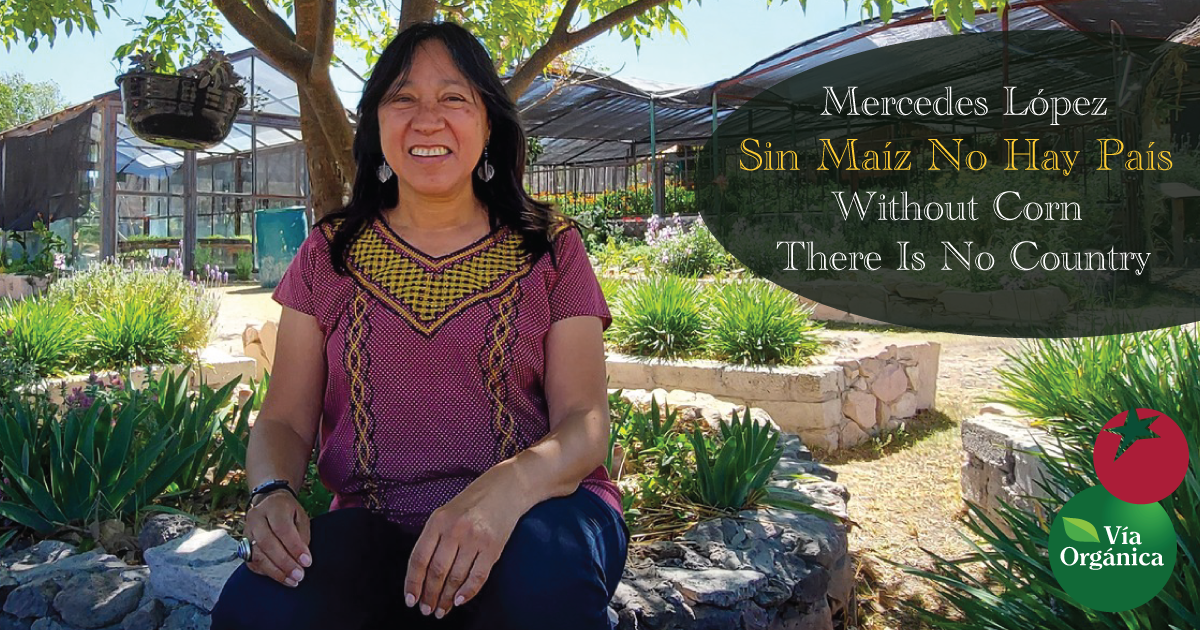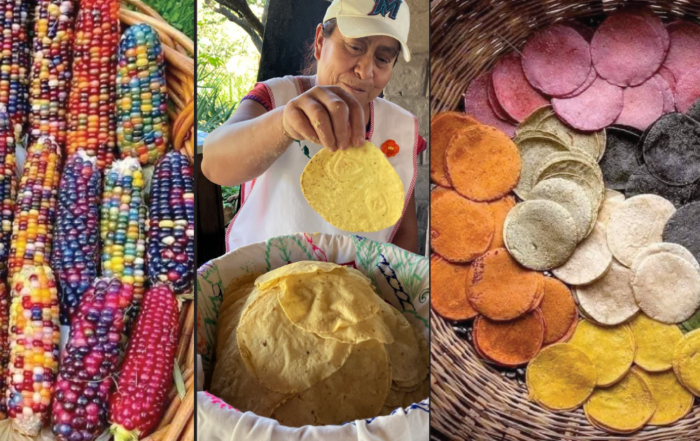The Three Trade Lawyers Who Will Decide Whether Mexicans Can Be Forced to Eat the U.S.’s Genetically Engineered Corn Soaked in Monsanto-Bayer’s Toxins
May 7, 2024 | by Alexis Baden-Mayer
Organic Consumers Association
Mexico has been making bold policy moves against genetically modified crops and the toxic pesticides they were engineered to be grown with, by phasing-out imports of GMO corn and showing its support for food sovereignty, soil regeneration and agroecology.
But, how serious could Mexico be, if it is now ceding its national sovereignty to a three-person panel of the Canada-United States-Mexico Agreement (CUSMA) under which the United States is challenging its 2023 Corn Decree?
Supposedly, Mexico wants food sovereignty and self-sufficiency, but apparently, it values trade with the United States and Canada so much that it is willing to let its democratically enacted laws be superseded by this so-called “free-trade” agreement. (What’s so “free” about it, if it can be used to force a country to import stuff it doesn’t want?!)
This is an absurd and illegitimate process where, under the dispute settlement provisions of the Canada-United States-Mexico Agreement, three trade lawyers will decide whether Mexicans can be forced to eat the United States’ genetically engineered corn, soaked with Monsanto-Bayer’s toxins.
Canada joined the case, taking the United States’ side. It was allowed to do so, even though it doesn’t have anything to gain or lose by the decision, but the CUSMA panel prevented the Canadian Biotechnology Action Network and the Council of Canadians, as well as National Farmers Union of Canada and Farm Action of the U.S. from submitting testimony.
What’s up with that? Not only can three trade lawyers decide whether to strike down the democratically enacted laws of a supposedly sovereign country, but they can tell anyone who doesn’t like that to just shut up about it and refuse to even acknowledge them! Even if these people are the farmers who will be impacted by the decision! Food Tank reported that:
“In its response inviting Friends of the Earth (FOE) to submit comments on the science justifying Mexico’s concerns about the safety of GM corn in its tortillas, the panel stipulated that such comments must:
“exclude any discussion of ‘glyphosate-based herbicides and Bt endotoxins,’ which is a factual issue not before this Panel, and focusing solely on the ‘human health and environmental impacts of the GM white corn.’”
“Exclude what? Those are the main human health concerns.
“Bt endotoxins are one of the two main forms of genetic modification in corn, inserting a bacteria into the corn genome to kill the European corn borer and other pests. As their letter outlines, FOE’s submission would present a raft of new evidence that the Bt endotoxin, which acts on the gut of the corn borer, may well affect the guts of organisms that consume genetically-modified Bt corn. With huge increases in recent years in Mexico and the U.S. in gut-related diseases, from Crohn’s to leaky-gut, what could be more germane to questions of human health?
“Perhaps only the possible residues of glyphosate sprayed liberally on the other variety of GM corn engineered to tolerate Roundup and other glyphosate-based herbicides. Residues are a proven problem and much recent evidence links low-levels of exposure over long periods of time to kidney, liver, and other health problems.
“Most GM white corn from the U.S.—which is not the familiar sweet corn—has both traits, so most GM corn coming into Mexico may present risks from both Bt and glyphosate residues. Indeed, both have been found in tortillas and other corn-based consumer products in Mexico.
“How is the panel going to assess Mexico’s claim that it is taking precautionary measures to protect public health if those risks are excluded from the outset? One hopes that the panel misunderstood some of the technical language in FOE’s letter. If not, the restriction exhibits either a profound misunderstanding of the science of GMOs or a systemic bias that excludes the main health risks under discussion, accepting as given the U.S. stance that GMOs are “substantially equivalent” to their conventional counterparts, so no further study is needed.
“Mexico is insisting that its high levels of consumption of minimally processed corn call for precaution in the absence of scientific evidence of safety. In fact, civil society groups here recently urged the Mexican government to initiate a USMCA counter-suit against the U.S. for these reasons. Whatever the motivations, the panel’s restrictions suggest a cultural insensitivity that does not bode well for a body empowered to rule on the health, environmental, and cultural integrity of Mexico’s cherished corn culture and diet.”
Following the publication of Food Tank’s article, the panel withdrew the exclusions it had placed on Friends of the Earth.
Who are these people running this CUSMA panel anyway?
Christian Häberli, Hugo Perezcano and Jean Kalicki.
Christian Häberli is a Fellow of the World Trade Institute. Häberli was a trade negotiator for Switzerland in the Global Agreement on Tariffs and Trade and the World Trade Organization (1986 to 2007). He was Chair of the WTO Committee on Agriculture (2005 to 2007) and served as Chair (every other year) of the Joint Committee of the Agriculture Agreement Switzerland–EU (2002 to 2007).
Throughout his entire career, Häberli served as a panelist in WTO and bilateral trade disputes (1996 to 2020). In that role, he drafted “the most damaging decision in the history of world trade agreements.” That’s according to F. William Engdahl’s 2006 article, “WTO, GMO and Total Spectrum Dominance” that became part of his 2007 book, Seeds of Destruction: the Hidden Agenda of GMOs. According to Engdahl:
“On February 7, 2006, a private organization with unique powers over world industry, trade and agriculture, issued a Preliminary Draft Ruling on a three-year-old case. The case was brought by the Bush Administration in May 2003 against European Union rules hindering the spread of genetically-engineered plants and foods. The WTO ruling … will have more influence over life and death on this planet than most imagine.
“The ruling was issued by a special three-man tribunal of the World Trade Organization, in Geneva Switzerland. The WTO decision will open the floodgates to the forced introduction of genetically-manipulated plants and food products — GMO, or genetically-modified organisms as they are technically known — into the world’s most important agriculture production region, the European Union.
“The WTO case arose from a formal complaint filed by the governments of the United States, Canada and Argentina – three of the world’s most GMO-polluted areas.
“The WTO three-judge panel, chaired by Christian Haberli … ruled that the EU had applied a ‘de facto’ moratorium on approvals of GMO products between June 1999 and August 2003, contradicting Brussels’ claim that no such moratorium existed. The WTO judges argued the EU was ‘guilty’ of not following EU rules, causing ‘undue delay’ in following WTO obligations.
“The secretive WTO tribunal also ruled, according to the leaked document, that in terms of product-specific measures, the completion of formal EU government approval to plant specific GMO plants had also been unduly delayed in the cases of 24 of 27 specific GMO products that the European Commission in Brussels had before it.
“The WTO tribunal recommended that the WTO Dispute Settlement Body (DSB), the world trade policeman, call on the EU to bring its practices ‘into conformity with its obligations under the (WTO’s) SPS Agreement.’ That was the notorious Sanitary and Phytosanitary escape clause of the agribusiness industry allowing it to use WTO trade supremacy to trample national rights to care for the health and safety of their citizens. Failure to comply with WTO demands could result in hundreds of millions of dollars in annual fines.”
In September 2006, the WTO tribunal reversed its decision, noting that “the European Commission had in the meantime changed its procedures to approve a number of different GMO varieties for commercial use and that a moratorium or official prohibition no longer existed. Unfortunately, it was true.”
Hugo Perezcano is a Mexican-Canadian attorney and international trade consultant in private practice. He most recently worked at the Canadian Centre for International Governance Innovation (CIGI). Before working at CIGI, Perezcano worked for the Mexican government’s Ministry of Economy for nearly 20 years, serving as head of the trade remedy authority, and formerly as general counsel for international trade negotiations. He was lead counsel for Mexico in investor-state dispute settlement cases under the North American Free Trade Agreement (NAFTA) and other international investment agreements as well as in dispute settlement cases between states conducted under trade agreements that include NAFTA and the World Trade Organization agreement.
Perezcano has presided on panels in several trade disputes, and in one, he was found by a Canadian court to have failed to disclose a significant conflict of interest. He wrote a decision in favor of Mexico, failing to reveal that Mexican officials were communicating with him during the arbitration and had invited him to join two rosters of trade agreement arbitration panels, a lucrative incentive to decide the case in their favor. According to Osler.com:
“The Court held that Mexico’s arbitral appointee, Perezcano, had a duty to disclose Mexico’s offers to appoint or nominate him to the arbitration rosters, as the offers were valuable professional opportunities that gave rise to justifiable doubts as to his impartiality or independence under the authoritative IBA Guidelines on Conflicts of Interest in International Arbitration. Perezcano had incentive to please Mexico after being notified of the appointments, and confirmation of his appointment to one of the panelist lists occurred the day the Award was issued. The failure of Mexico and Perezcano to disclose the communications and offers during the arbitration compounded the finding of a reasonable apprehension of bias.
“However, exercising its discretion not to set aside the Award under Article 34(2) of the Model Law, the Court found that this reasonable apprehension of bias did not undermine the reliability of the result and did not produce real unfairness or real practical injustice. Although it appeared that Perezcano spent significantly more time on the case than his co-arbitrators on the Tribunal, evidence did not show that the other two arbitrators passively accepted Perezcano’s views in drafting the Award or in deliberating — the presumption of impartiality and independence therefore prevailed. All three arbitrators signed the Award and shared the same view as to the disposition of the arbitration. Further, the potential prejudice flowing from redoing the arbitration would have been significant: wasted time, resources, fees, and witnesses’ recollections for events which took place approximately 20 years ago.”
Perezcano’s unethical undisclosed communications with one of the parties to a dispute he was deciding underscores how unjust the whole system is. Unlike countries’ courts where the judges are either appointed by elected officials or elected themselves and are paid by the taxpayers they serve, and then are assigned cases randomly, in trade dispute resolution, the arbiters are appointed by the parties and there’s a huge incentive to try to serve their interests in the hopes of being appointed again. There’s a huge financial conflict of interest built into the system.
Jean Kalicki was a partner at Arnold & Porter where she worked for 17 years prior to becoming an independent arbitrator in 2016, so her corporate conflicts of interest list must be significant, though it is not publicly available. She’s among the top arbitrators globally, ranked “Most In-Demand.”
Why should trade lawyers like Christian Häberli, Hugo Perezcano and Jean Kalicki have the power to decide whether Mexico must import pesticide-drenched GMO corn?
They shouldn’t! Trade agreements shouldn’t supersede the laws of sovereign countries!
TAKE ACTION: Tell Congress to Get Out of the Canada-United States-Mexico Agreement!
Related Posts
Together We Are Making Waves
May 16, 2024 | by Rose Welch, National Director Organic Consumers Association Spring greetings from all of us at the Organic
Make Your State the First to Ban Monsanto’s Roundup Weedkiller!
Our Millions Against Monsanto campaign to ban glyphosate is gaining steam in statehouses across the country.
Which U.S. state will be the first to ban glyphosate-based weedkillers like Roundup, the flagship pesticide manufactured by Monsanto (now owned by Bayer)?
Will it be yours?
Take Action: Make your state the first to ban Monsanto’s Roundup weedkiller!
Organic Bytes Newsletter #850: Mexico’s Right to Refuse GMOs
BILLIONS AGAINST BAYER Using a Trade Agreement to Bully Mexico Into Importing Monsanto-Bayer’s GMO Corn By Alexis Baden-Mayer, Political Director, OCA: Mexico has been making bold




